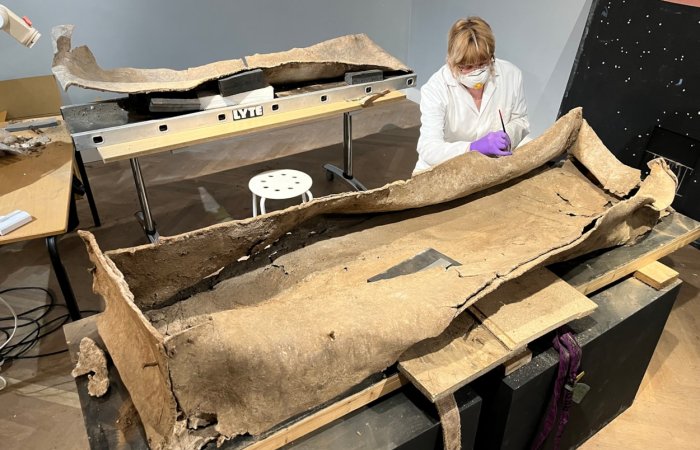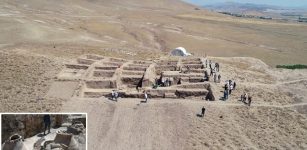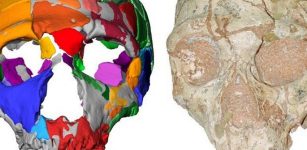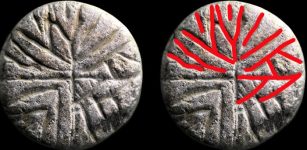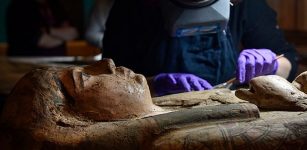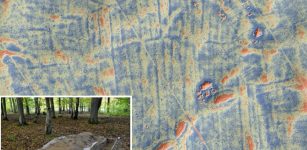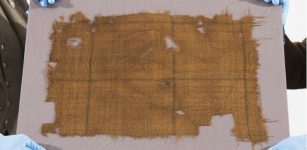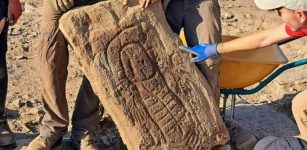Ancient Roman Coffin Found In Leeds Revealed To The Public For The First Time
Jan Bartek - AncientPages.com - A lead coffin dating back over 1,600 years has been unearthed in a field in Leeds and will soon be unveiled to the public. This remarkable find, which experts consider a rare occurrence, was discovered during an excavation conducted by West Yorkshire Archaeological Services at an uncharted site near Garforth.
Credit: Leeds City Council
The coffin held the remains of a woman estimated to be between 25-35 years old. Given her burial with adornments such as a bracelet, glass bead necklace, and either a finger ring or earring, it's believed that she was of high social standing, potentially even Roman aristocracy.
Archaeologists from West Yorkshire Archaeological Services have made an intriguing discovery. After conducting a detailed analysis, they found that a coffin also contained the partial remains of an unidentified child, estimated to be around 10 years old. The relationship between this child and the Roman woman originally associated with the coffin remains unclear. However, carbon dating has shown that their burials occurred simultaneously, sparking curiosity about late Roman burial customs in Britain.
The coffin and its fragile lid have suffered significant distortion due to centuries of burial. They are currently undergoing meticulous conservation and stabilization for exhibition at Leeds City Museum. Here, they will be showcased in a custom case as one of the main exhibits in "Living with Death". This new exhibition, opening on May 3rd, explores how different cultures worldwide handle death, dying, and mourning.
The archaeological excavation in Garforth, conducted in 2022, revealed a wealth of historical artifacts and human remains. Over sixty individuals—men, women, and children—who lived over fifteen hundred years ago were discovered. The unearthed remains represent both the late Roman and early medieval periods.
This is evidenced by the burial customs observed and the variety of objects found within their graves, such as knives and jewelry. These findings provide a fascinating glimpse into the lives of these ancient communities.
"This is a truly unique and remarkable find which has potentially huge implications for our understanding of the history of early Leeds and those who made their home here.
The discovery of the remains of a second individual within the coffin is fascinating, particularly as they belonged to a child. It poses some interesting questions about how people more than 1,600 years ago treated their dead.
The Roman lead coffin itself is also the only one ever discovered in West Yorkshire and the site has provided us with new opportunities to study life and death in ancient Yorkshire. We’re delighted to be able to display the coffin so quickly after excavation, and we’re looking forward to sharing this amazing piece of history with our visitors," Kat Baxter, Leeds Museums and Galleries curator of archaeology, said in a press release.
The exhibition, Living with Death, will feature a variety of displays that delve into the diverse ways in which death, dying, and grief are experienced. These exhibits will encompass personal narratives and artifacts from around the globe and across different eras. Notable items include an intricately designed Ghanaian coffin shaped like a lion from ArtDocs, a mummy portrait from Egypt's Roman period courtesy of Manchester Museum at The University of Manchester, and objects associated with Mexico's Day of the Dead festivities.
Throughout the year, this exhibition will be supplemented by talks, workshops and events suitable for all ages. The aim is to stimulate broader discussions about our attitudes towards death.
"This fascinating exhibition will reveal some astonishing facts and information about the history of Leeds and how people lived and died in our city centuries ago.
See also: More Archaeology News
But it will also explore how the subject of death spans and unites different cultures around the world, and I’m sure it will provide some fascinating insights for visitors," Councillor Jonathan Pryor, Leeds City Council’s deputy leader and executive member for economy, culture and education, said.
Living with Death, generously sponsored by Co-op Funeralcare, will be at Leeds City Museum from May 3, 2024, until January 5, 2025. It is free to visit.
For more information, please visit: Living with Death - Leeds Museums & Galleries
Written by Jan Bartek - AncientPages.com Staff Writer

